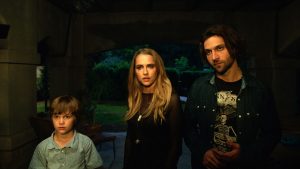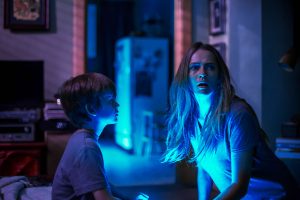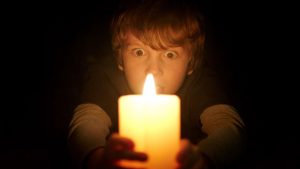![]()
It’s really too bad. The new horror picture Lights Out is based on a very scary short film that garnered so much attention from studios that it was developed into a feature. It is about the nasty, violent spirit of a girl who exists exclusively in the darkness, stalking her prey whenever the lights go out (and when they don’t, by turning the bulbs off herself). There’s a really fun and exciting opening scene that really takes advantage of the premise, locking a couple of workers in a factory space and moving the spirit closer and closer between flickers of light.
 Unfortunately, there isn’t much more to this feature. Yes, several sequences with silhouettes moving in the dark and reaching out for characters are quite eerie, but the script isn’t nearly developed enough to carry us though its brief 80 minutes. As well-timed and skillfully edited as some of these scares are, if we don’t buy into the plight of the characters, the end result isn’t gripping. And unfortunately, the script struggles to develop believable roles.
Unfortunately, there isn’t much more to this feature. Yes, several sequences with silhouettes moving in the dark and reaching out for characters are quite eerie, but the script isn’t nearly developed enough to carry us though its brief 80 minutes. As well-timed and skillfully edited as some of these scares are, if we don’t buy into the plight of the characters, the end result isn’t gripping. And unfortunately, the script struggles to develop believable roles.
Rebecca (Teresa Palmer) is an independent young woman estranged from her mother Sophie (Maria Bello). After her little brother Martin (Gabriel Bateman) arrives at her door unexpectedly to voice concern about his mom’s behavior, Rebecca is forced to return home. As if Sophie’s bouts with depression and the recent loss of her husband aren’t enough, the boy expresses fear about the strange, two-way conversations their mom has been having by herself in darkness. As Rebecca becomes entangled in the mess, she soon realizes that it has to do with someone named Diana… a strange figure from her parent’s past.
 One big mistake made early on is to focus on just how antagonistic the relationship between Rebecca and her mother is. They’re obviously supposed to be at odds, but the movie doesn’t offer anything to help us sympathize with either of them. The only character audiences will be feeling badly for is the heroine’s boyfriend Bret (Alexander DiPersia), who gamely takes a lot of unnecessary flak from Rebecca. Overall, our lead doesn’t come across as the most relatable character.
One big mistake made early on is to focus on just how antagonistic the relationship between Rebecca and her mother is. They’re obviously supposed to be at odds, but the movie doesn’t offer anything to help us sympathize with either of them. The only character audiences will be feeling badly for is the heroine’s boyfriend Bret (Alexander DiPersia), who gamely takes a lot of unnecessary flak from Rebecca. Overall, our lead doesn’t come across as the most relatable character.
As mentioned, the film’s scare sequences are well handled. A couple are tense, even though the familiarity of having lights go out and come on again with the supernatural force moving closer eventually loses its impact. Later in the tale, characters are forced to find alternative sources of lighting to save themselves, and the movie takes silly turns with all manner of illumination being thrown around.
And as for the mystery around who that strange figure Diana is… that is solved, well, ridiculously quickly. The protagonist visits her mom’s house and quickly discovers a file that pretty much accounts for everything (as well as it’s going to be explained, anyway). It’s another tension killer that gives away too much, too early.
 The movie also suffers from inexplicable decisions and behavior. Why do characters seem relatively nonplussed in the next scene after being assaulted by a malevolent spirit? Why does Rebecca continually choose not to inform her helpful boyfriend Bret of the mortal danger he is in as events spiral out of hand? For that matter, why is Bret even interested in the lead when she treats him so poorly? These and many other questions will not be answered over the course of the film.
The movie also suffers from inexplicable decisions and behavior. Why do characters seem relatively nonplussed in the next scene after being assaulted by a malevolent spirit? Why does Rebecca continually choose not to inform her helpful boyfriend Bret of the mortal danger he is in as events spiral out of hand? For that matter, why is Bret even interested in the lead when she treats him so poorly? These and many other questions will not be answered over the course of the film.
Lights Out has a couple of early scares and is quickly paced. There just isn’t enough meat on its bones. After a strong opening, everything slowly falls apart. I can really only vouch for it as one of those B-movie drive-in features that will garner as many laughs as authentic scares. It certainly isn’t the worst horror film I’ve seen in a while, but overall the fright factor is dim.


